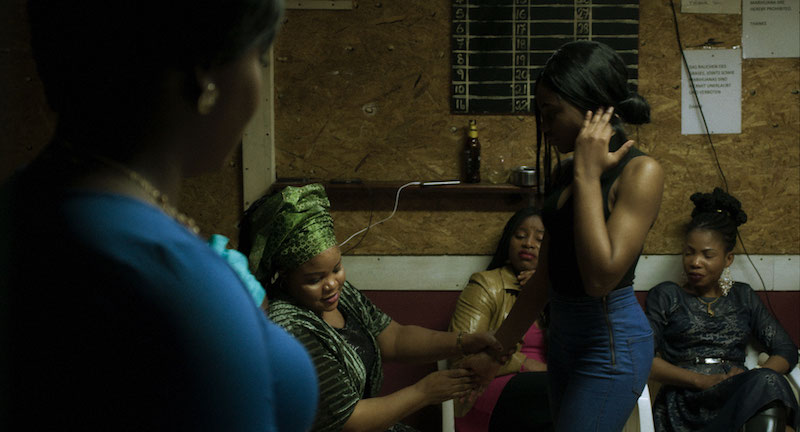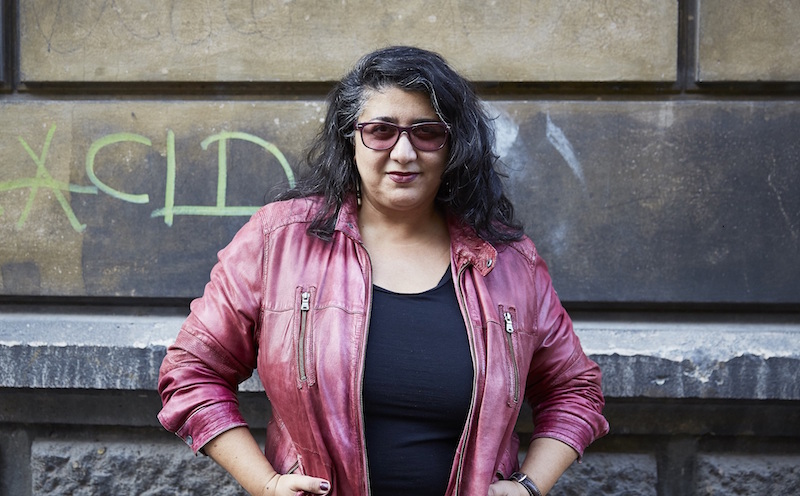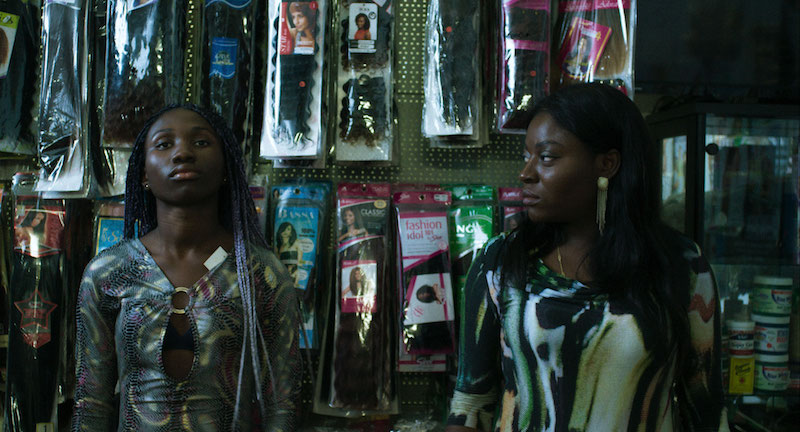As we watch our nightly dose of immigration porn fed to us by the local news channels, particularly those of us who live in Europe we see row after row of young men stepping off boats and assorted vessels. We could be mistaken into thinking that they left their women safe at home, in their country of origin, the wives and girlfriends and mothers awaiting their return, as well as their paycheck. That's so far from the truth and if you ever held such a wrong opinion, 'Joy' by Sudabeh Mortezai will set you straight.
In her beautifully shot and perfectly told film premiering in the Giornate degli Autori, Venice Days sidebar at the Venice Film Festival, Mortezai shows us the complex network of Nigerian women who virtually invisibly inhabit our European streets. 'Joy' is as much about the oldest profession in the world, the prostitution networks these women get sucked into and then, once they have paid off their debts, also manage and run in Europe, as it is about womanhood itself. We follow the story of these young women from the juju ritual they are subjected to at home, in Benin City Nigeria, to the streets of Vienna where they owe their traffickers the kind of money one wouldn't spend traveling around the world for a year and staying at the best hotels.
Yet Joy (played by Joy Anwulika Alphonsus), the title character who along with newcomer to the streets Precious (played by Precious Mariam Sanusi) manage to navigate the tough waters of being sex workers in a land away from theirs. And they work well through the delicate dynamics of having women as madams while also, in an unsentimental way, begin to create a special bond between them. In one of the most touching scenes in the film, Joy brings Precious to a beauty parlor and acts out as her temporary Pygmalion right there, amidst purple hair extensions, tight spandex dresses and way too high gold heels.
'Joy' managed to walk away from the Lido with two coveted prizes -- the first ever Hearst Film Award 2018 for Best Female Direction for Mortezai as well as the Europa Cinemas Label Award.
Following is a short interview with Mortezai, who has Iranian roots but grew up in Austria herself.
You do something very subtle in ‘Joy’. You tell us about things that are in the headlines today but also do it in a very human way. And you bring out facts we didn’t know like how the girls have a juju put on them and most of the madams are women too. How did you decide to make it this kind of story?
Filmmaker Sudabeh Mortezai
Sudabeh Mortezai: At the beginning for me it was also the shock of how is it possible that it’s women exploiting other women and why does this happen. Those were the starting points. And what does a woman have to experience in order to get into this kind of position. To become the exploiter herself.
I like to do research, to immerse myself into a theme, before I start to form any opinion, I like to just try to understand what is going on. And then I like to put away any judgement I may have had before and be open.
And you also immerse us, the audience into the story, that way.
Mortezai: Yes, that was my intention. First to immerse myself and then leave off my judgment. For example for the longest time I was hoping to find a more hopeful ending for the film. At some point, especially when I went to Nigeria and met a lot of women there, and saw the society there and how the whole economy of this whole city, Benin City, works on trafficking — I started to understand this cannot have a happy ending.
It’s a hopeful ending in some ways but yes, not a happy one…
Mortezai: I wanted, whatever I experience to also immerse the audience into that kind of feeling and I wanted it to be very close and intimate. With the DoP Klemens Hufnagl we wanted the audience to feel like someone in this apartment, one of the women is filming this. Without it looking amateurish. But give the feel as if someone who is living in that apartment picked up the camera and is documenting their lives.
It feels like a documentary, that’s the best of it, is the fact that we don’t know where the line is crossed. Even your actresses have taken on the names of the characters.
Mortezai: I like this blurry line, I have to say, and I like to leave it blurry -- what is fact and what is fiction… There is a lot of facts in there! It’s fiction in terms of the story being fictionalizes but I can assure you that after talking to many many women who experienced this it’s a very true story nevertheless. It could be the story of many women, happening today.
Precious Mariam Sanusi, left, and Joy Anwulika Alphonsus in a still from 'Joy'
There is a wonderful scene at the beginning of your film where Precious, the newcomer, is helped by Joy, a pygmalion like figure in that moment when she takes her to the beauty parlor, and buys her a dress. How did you write that and how much did your actresses help in making it such a beautiful moment?
Mortezai: That scene is interesting because it’s a perfect mixture of mise-en-scène and improvisation. I had a very clear idea of what I wanted from the scene. I wanted right after this very violent rape scene to see the transformation of Precious. Like an initiation sort of scene. It was a written scene but the only part of the dialogue that I really wanted to be said was when Joy warns Precious and says “each one on their own, don’t trust me either.” That’s the only line that I wanted to be said. Everything else is improvised and the fantastic thing was that I didn’t even write the scene in a way that “she makes her walk, like in a bootcamp and stand like this.” That only happened in the shooting. And it was so fantastic, we were standing there and the take was immensely long… And the two hairdressers it’s actually their shop and we got permission to film there and I asked if they wanted to participate and they were happy to do it.
And they brought in all this humor. It’s ambivalent because it’s somehow cynical and very human — with all this humor which is all them.
Do you think at our best women have a strong sisterhood instinct?
Mortezai: I think we do have it. But we should appreciate it more. I think the rivalry is too pronounced but it’s not necessary. The sisterhood is something really emotional that happens from the beginning. I know with friendships with women, even if you are sometimes not nice to each other or everyone is very selfish there is something that remains, this shared experience of womanhood that binds us together.
How did you find your actresses?
Mortezai: We actually did very normal casting, a lot of street casting and we were trying to find women from Nigeria. For me it was very important they are from Nigeria. For example some other African women from other countries came to the casting and I told them, I’m sorry I’m not doing that. You might be the best actor in the world but I want someone who really knows the kind of Pidgin they speak, the culture, everything. I needed it to be very authentic. We had casting calls, in Nigerian food shops, in churches, we had casting scouts go out to hair salons and get people to come. A lot of women showed up and I have to say, what was really surprising was the vast majority of the women were very open. They talked about the subject of the film and a lot of women opened up to us in the casting and told us their stories.
Every Nigerian knows about it, what goes on.
Do you think that as women, and I see it through Precious and her development in the film, sex becomes a way to have power?
Mortezai: I think most definitely. It’s such an interesting thing you are pointing out. For all women, even if they have nothing remotely to do with prostitution, it has nothing to do with that specifically, to have sex as a means of gaining power is part of being a woman. How much you actually live it out or use it is a different question. Whether you choose to do it a lot or not.
Precious learns what she has to do to survive in the film. And that’s what I also experienced talking to these women in my research and in the castings. They have experienced unimaginable things but it makes them stronger. They learn to cope and they learn to adapt.
You say you did a lot research for ‘Joy’ but in order for the film to work as it does, you must have felt a kinship too with these women. How did you find your connection with the story? And I assume this is far from your own life story!
Mortezai: It’s actually very very far from my life story. I come from a very well behaved, intellectual bourgeois family. Very privileged Iranian family — so I do have the experience of immigration and racism but still I was in a very privileged position most of the time.
And yet, I feel entirely connected to these women! But I think it’s this shared experience of womanhood, even if you come from different places there is something that we share in being a woman. And it really binds us together. The film I made before ‘Macondo’ was a really male movie. A father and son story where the female characters were small and few, so this is just the opposite — almost only women. It was a completely different feel making this film. So much more personal.
If you hadn’t been a filmmaker, what would you have done in life?
Mortezai: Hard to answer, but as a very very small child, I always wanted to be a writer.


